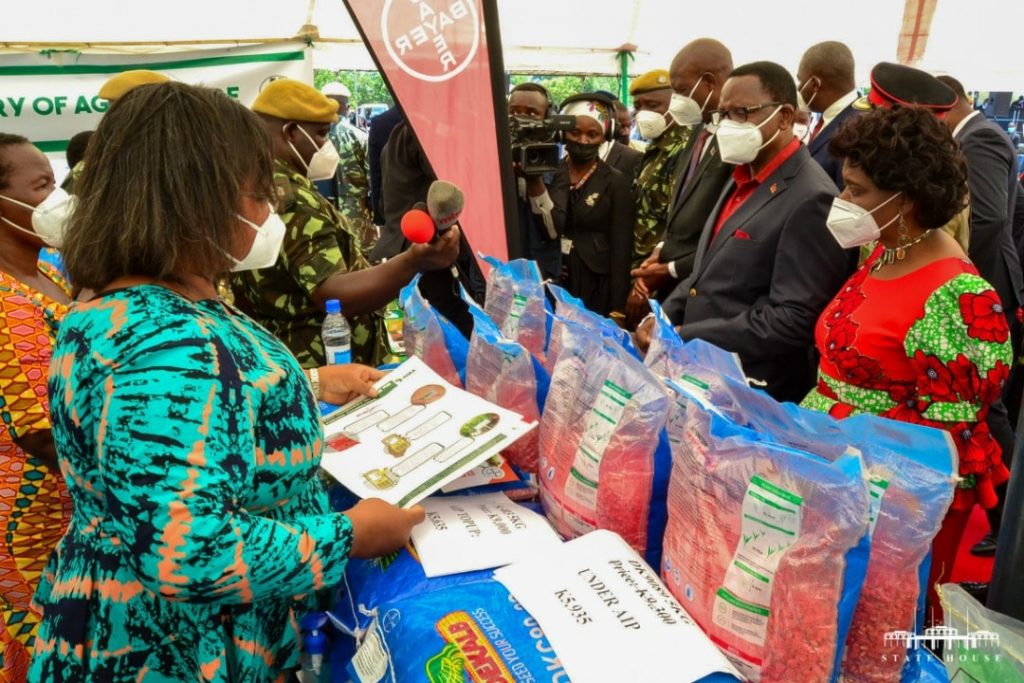MPs role in AIP draws criticism
Ministry of Agriculture has come under fire for drafting legislators in the transport logistics of Affordable Inputs Programme (AIP) with commentators describing the last-minute arrangement as compromising the oversight function.
Ministry of Agriculture spokesperson Gracian Lungu said in an interview on Tuesday that the involvement of members of Parliament (MPs) in the transportation of fertiliser and seeds under the programme is meant to speed up delivery.

He said the MPs will be distributing fertiliser from warehouses of State agency Smallholder Farmers Fertiliser Revolving Fund of Malawi (SFFRFM) to Agricultural Development and Marketing Corporation (Admarc) depots in their respective constituencies.
Lungu said: “In transporting these inputs, MPs will be serving their constituents, but in the end, Admarc will pay for this service.
“Admarc already budgeted funds for this transportation exercise and these MPs will be paid based on the rate every transporter is paid per kilometre.”
But reacting to the arrangement, several governance and economic commentators on Tuesday said in separate interviews that the move is questionable, especially from the governance point of view.
In an interview, University of Malawi Department of Political and Administrative Studies Associate Professor Blessings Chinsinga observed that by the nature of their role, legislators are expected to provide an oversight function to the Executive branch on public expenditure.
He said in that respect, having the legislators playing the role of hired transporters of AIP materials will put them in a conflict of interest situation.
Chinsinga said while the decision may make political sense to have MPs help expedite the transportation process in the interest of the people they serve, there are serious governance concerns.
He said: “No matter how advantageous this maybe, we will fault it because it undermines the separation of power where MPs are supposed to provide oversight function to the Executive because once they get involved they become an interested party.”
On his part, agriculture policy analyst Tamani Nkhono-Mvula said in as much as the interest is to have the fertiliser delivered to the people, bringing legislators on board raises serious questions on government’s preparedness to run this project.
He said government had all the time to identify means of delivering the commodities on time across the country.
Nkhono-Mvula said: “For purposes of transparency and accountability, MPs must not be involved. What if there is a mess, who will ask questions when they are transporters themselves?
“We know government is desperate. The rains are here and yet it delayed to deliver the commodities. Why can they not use MDF [Malawi Defence Force] in such an emergency?
“Why can they not learn from MEC [Malawi Electoral Commission] on how it managed to deliver election materials in 2020 within a week using MDF and other transporters? There are surely better ways of delivering the same without compromising the accountability aspect.”
Making his point in a separate interview, Centre for Social Accountability and Transparency executive director Willy Kambwandira described the arrangement as “a very dangerous move and politicisation of the AIP”.
He also accused the ministry of poor management of the programme.
Kambwandira asked the MPs not to accept the offer but to respect their constitutional duty of providing oversight.
He said: “The role of parliamentarians is not to provide transportation services to government, but rather provide oversight and accountability in management of public resources and service delivery, including AIP.
“Who will take government to account? Again, the whole arrangement is in total breach of the procurement law.”
Parliamentary Committee on Agriculture and Food Security chairperson Sameer Suleman also faulted the arrangement, describing it as a sign of poor planning.
He claimed that the programme was already in a mess as there were several outstanding issues, including access to seeds.
Suleman, who is Blantyre City South East legislator affiliated to Democratic Progressive Party (DPP), said legislators received communication from Ministry of Agriculture to deploy their vehicles for the exercise.
“If they planned properly, they would not have panicked. The rains are here and we do not have enough fertiliser, there is no seed and the issue of network we have not been updated,” he said, adding that his committee will engage the Ministry of Agriculture on the outstanding issues.
Despite the criticism the arrangement has drawn, Lungu maintained that MPs were the best option.
He said: “Another thing to note is that the chances of misbehaving in transportation process will be minimal since people have trust in most of these MPs in their respective constituencies.”
Currently, Admarc has a stock of about 90 000 tons of fertiliser under AIP to be ferried to hard-to-reach areas.
Rolled out in the 2020 agriculture season, AIP, like its predecessor Farm Input Subsidy Programme (Fisp) implemented under DPP, has been beset by problems mainly bordering on logistics.
In its October 30 2021 edition, our sister newspaper Weekend Nation reported that there were fresh bottlenecks in the programme, especially involving small and medium scale entrepreneurs (SMEs) government seeks to empower.
The story stated that some SMEs were yet to access loans to buy inputs while others were yet to get formal contracts.
President Lazarus Chakwera officially launched this season’s AIP on October 16 2021 in Chiradzulu.





